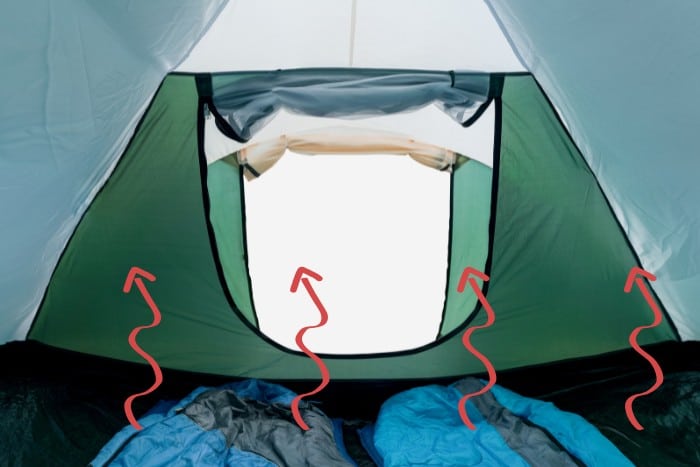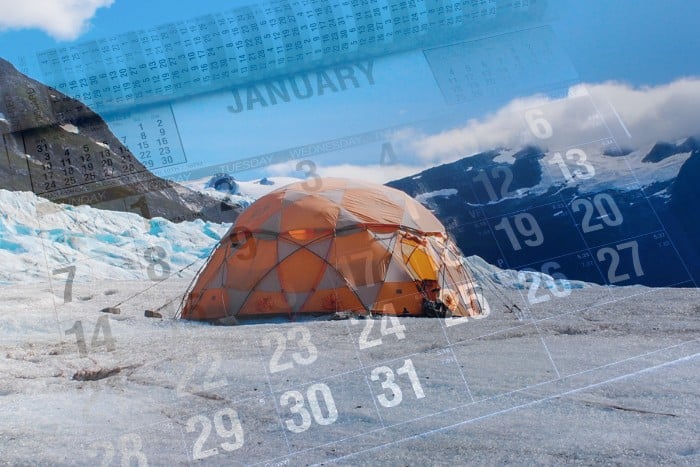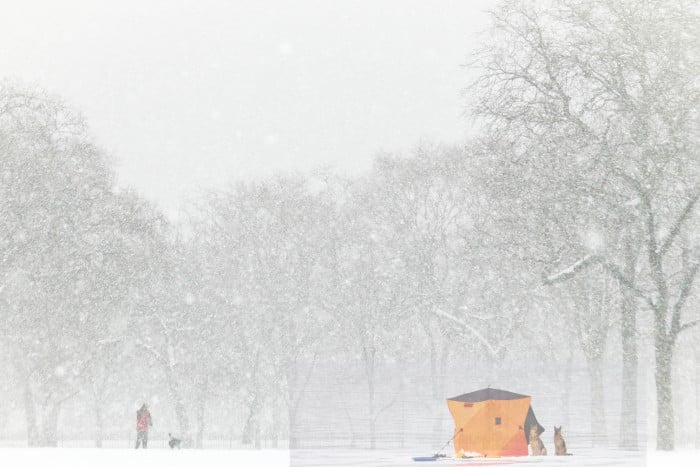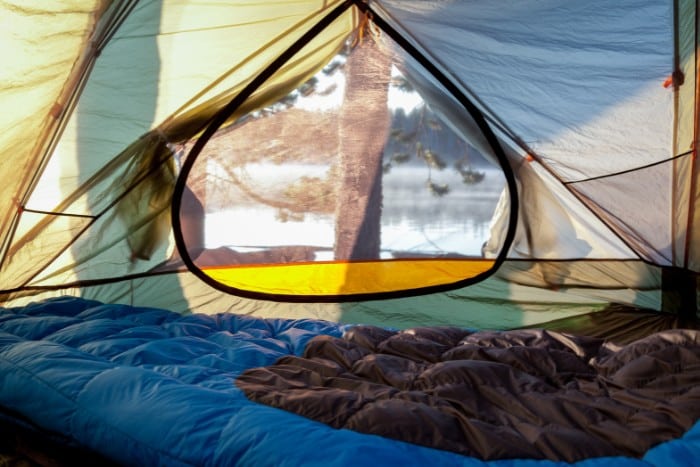Ice fishing is, by nature, a cold-weather hobby. The weather can be snowy, windy, and well below freezing. Ice fishing tents can make this weather more manageable.
Only some ice fishing tents are insulated, and it’s not necessary for a good fishing experience. While you might not need insulation in your tent, having it makes your fishing experience more comfortable by trapping warmth, preventing condensation, and providing better protection from the weather.
Below we’ll cover the benefits and drawbacks of having an insulated ice fishing tent, so you can decide if you need one.
Why You May Need An Insulated Tent For Ice Fishing?
Whether or not you need an insulated tent for ice fishing is a personal choice, although some factors affect how useful you’ll find the extra insulation.
Understanding the benefits of insulated walls will help you decide on the right shelter for your needs.
Also, there rises a basic question which I’ve covered in a separate article: Are Ice Fishing Tents Insulated by Default?
1. It’s Warmer
The most obvious benefit of having an insulated tent for ice fishing is that it will be warmer than an uninsulated tent.
Insulated tents work the same way as a sleeping bag or house by trapping the warm air and keeping the cold air out.
The insulation on its own won’t make the inside of your tent warmer, but it will increase the efficiency at which your natural body heat or a heater will warm up the inside of the tent.
Insulation will also keep this heat trapped longer, so if you leave and come back, it’s much more likely to be warmer than the outside air.

2. It’s More Efficient If You Use A Heater
If you have a propane heater, you’ll burn more gas to achieve the same results the less insulated a tent is.
Insulation on the walls and floor will minimize how much the heat escapes and save fuel and money in the long run.
Similarly, electric heaters will use less energy, which can significantly extend your trip if you use a generator or battery.
When heating a tent for ice fishing, it is important to have ventilation for any carbon monoxide gas to escape, so be sure to crack some windows and have plenty of airflow to stay safe.
3. Sleeping In An Insulated Tent Is Better
If you plan on sleeping overnight while ice fishing, an insulated tent acts almost like a second sleeping bag and will be much more comfortable for the anglers inside.
Temperatures can drop drastically overnight, and extra warmth and insulation can be vital for a comfortable trip.
Insulated tents are better at blocking out additional noise and light, which can also benefit sleeping in them.
Blocking out light can be beneficial during full moons and windy nights, making it easier to get a good night’s rest.
4. Durability Is Better With An Insulated Tent
The material that makes up insulated tent walls is typically much more durable and thicker than uninsulated tents.
Insulated tents will last through much use and abuse and hold up better in rough conditions.
While materials and construction will also play a part in how durable an ice fishing tent is, insulated tents are less likely to be made of a thin nylon fabric prone to ripping and stretching.
The sturdier materials will hold up in the wind and heavy snow loads, further improving their durability.
Better materials will increase the lifespan of your tent by several years, and well-made insulated tents can last several decades.

5. Less Condensation
Condensation is caused by various factors, primarily due to the combination of non-breathable material, lack of ventilation, and moisture from the occupants and equipment.
Insulated tents are typically dual-walled, significantly differentiating outside and inside temperatures and reducing condensation.
Well-made insulated tents also offer plenty of ventilation which is vital in keeping the tent from building up condensation.
Propane heaters also produce moisture, so if you use a heater inside the tent, it is essential to keep it ventilated to prevent condensation buildup.
6. Insulated Tents Are Heavier (In A Good Way)
Additional weight has some drawbacks, mentioned below, but it also can be a good thing in some situations.
This extra weight makes heavier tents better to set up in the wind and won’t be blown around so much.
Anchoring your tent with snow or stakes in the ice is still essential, especially in windy weather. Still, heavier tents will remain in place even during a moderate breeze compared to uninsulated tents.
Heavier tents will give you better peace of mind when set up for long periods and when you leave them for any time, which can be an important factor for some people.
7. Insulation Can Help In All Weather
For ice fishing, insulation is essential for keeping out the cold weather, but insulation will help in all weather.
Your ice fishing tent can be set up in the summer to keep you cool, keep the rain out, or perform well during winter storms.
Insulation goes a long way in keeping the warm air in or out for the same reason thermoses keep things hot or cold for long periods.
If you can set up your tent and the internal temperature is different than the outside, that insulation can help sustain that difference.

Why You May Not Want An Insulated Tent For Ice Fishing
There are a lot of positive reasons to get an insulated ice fishing tent, but there are also several drawbacks that come with them as well.
If you infrequently use the tent or are looking to save some cash on the purchase, going with an uninsulated tent might be the better path for you.
Below are five more reasons why an uninsulated tent might suit your needs better.
1. Insulation Is Heavy (In A Bad Way)
Above insulation, adding weight was mentioned as a positive reason to get an insulated tent, but there are some drawbacks to this extra weight too.
To start, hauling a heavier tent can be a strain without using ATVs or trucks, so if you pull your sled by hand, this is something to consider.
The addition of insulation will make the tent bulkier as well as heavier, so storing it and packing it takes up significantly more space.
If you drive a sedan or another smaller car, you might find yourself out of room for such a large tent.
2. Insulated Tents Are More Expensive
Price can be another significantly different factor between the two tent options and can steer many people toward uninsulated tents.
All else equal in quality between the two tents, the insulated one will cost 25-50% more.
The less frequently you go ice fishing and the less extreme weather you go ice fishing in, the better choice an uninsulated tent will be for you.
Going the cheaper route can make the most sense if you know you’re not going to be using a tent often while ice fishing.
Repairs for an uninsulated tent will also be much more affordable, often quickly done with a simple patch kit rather than requiring extensive sewing and insulation replacement.

3. It’s Not That Cold
An insulated tent might be overkill if it’s not that cold outside. Individual cold tolerances and local climates will play a role in deciding what temperatures are tolerable and which are too cold.
Heaters can still be used in an uninsulated tent so that the occasional cold weather can be circumvented through additional heat.
Even though it’s better to use a heater with insulation, if you rarely use your tent, there may be no noticeable difference overall.
Sunny weather while ice fishing will warm up an uninsulated tent more than an insulated one.
Warming up with natural factors is one of the few areas where an uninsulated tent can be warmer by acting like a greenhouse and trapping heat inside.
4. You Go In And Out Of The Tent Frequently
One of the ways that heat can be easily lost in an insulated tent setup is by frequently opening the door and going in and out.
If this describes you checking on tip-ups often, an uninsulated tent might work better.
Opening the door exposes the warm air inside the tent to the cold air outside, and it does not take long for the inside temperature to drop 20+ degrees.
Getting an uninsulated shelter might be plenty if you are looking at getting an ice fishing tent just to escape the snow and wind rather than a heated environment.
5. Insulation Can Result In A More Difficult Setup
If you are typically a solo angler, one of the most challenging parts can be setting up and breaking down the ice fishing tent.
Popup and flip-over tents are best for easy setup, and uninsulated tents will typically be easier to set up alone.
Manufacturers will have different constructions that result in more straightforward or more complex setups, so while this is a highly dependent factor, uninsulated tents will be lighter and easier to set up.
Some tents require insulation to be added to the tent as an additional step, which will increase setup time.
Extra support and poles may also have to be assembled for insulated tents compared to uninsulated ones, so this is something to check before purchasing.
What Are Key Features To Look For In An Ice Fishing Tent?
Whether you are purchasing an insulated or uninsulated tent for ice fishing, there are a few key factors to consider that will impact how the tent functions and who the tent is best for.
Many of these factors will be down to personal preferences and might increase the cost of the tent, so personal discretion will be essential.
Below are five critical factors to consider when choosing an ice fishing tent and deciding what options are the best for your needs.
1. Tent Style Vs. Flip-Over
The two main constructions of ice fishing tents fall into traditional tent style and flip-over.
The former uses poles as the frame for the tent, while the latter uses a sled as the base and has an expanding tent section that flips over the sled portion.
Tent-style tents are lighter, more compact, and typically less expensive but more work to set up and harder to move once it has been set up.
Flip-over tents, on the other hand, are heavier and bulkier but, thanks to the built-in sled, will carry all your gear for you and often come with built-in seats.
Flip-over tents are also much easier to set up and take down, so if you like to move frequently while ice fishing, these tents can save you time and headaches.
2. Floor Or No Floor
Floors are not necessary for ice fishing tents; they are usually either an additional part or just excluded. Floors can play a huge role in keeping you warm by creating a barrier between you and the ice.
Insulated shelters benefit the most from having a floor, mainly if you use a heater and want to prevent a slushy mess. Floors can also offer nonslip surfaces to make walking around inside the tent safer.
Adding a floor with other materials can efficiently insulate the tent, give the angler that extra cushion, and help you stay dry.

3. What Size The Shelter Is
Shelter size depends significantly on how many people you plan to fish with, how much gear you have, and if you have help setting up the shelter.
Solo anglers and pairs of anglers will benefit from having a smaller shelter, while groups will need extra space.
Smaller shelters will stay warmer since they have less air to warm up and less wasted space that isn’t being used.
Solo anglers will also have difficulty setting up a large shelter, so keep this in mind if you often fish alone.
4. Heater Adaptability
Only some tents work well with a heater inside, so look for this feature if you plan on using one.
Ventilation is the most crucial factor to consider, and looking for flame-resistant fabrics will increase the safety of using a heater.
Some ice fishing tents designed for long-term use will even have a stove jack to allow a wood stove to be put inside.
If long-term use is vital to you, this can be a feature to look for, especially if you already use firewood.
5. Materials
The materials of ice fishing tents can include canvas, nylon, 300D Oxford fabric, polyester, and more. Insulation materials can be synthetic or made of down.
The price for premium materials will be much higher than nylon or other cheap materials, so your budget will play a role in selecting a material quality.
While higher costs might not always result in a better tent, it often does and comes down to the materials and construction.
Wrapping Up
So there you have it, you might not need an insulated tent for ice fishing, but it can make your experience much more comfortable.
Insulated tents become more beneficial the colder the weather gets, so your local climate can also help you make that decision.
If you plan on using a heater or sleeping in your tent, having an insulated tent is also a huge plus.
However, an uninsulated tent will be much lighter, cheaper, and easier to use if you don’t need the extra features of an insulated tent.
